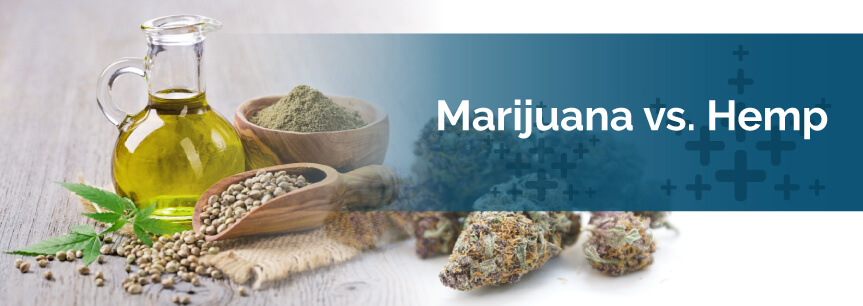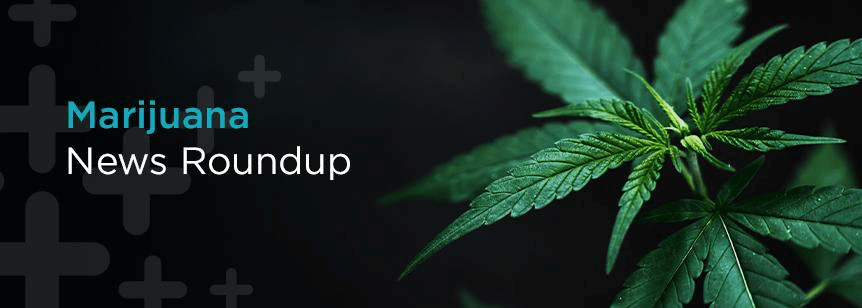When you think of cannabis, you likely have images in your head of someone smoking a joint or bong. You probably wouldn’t equate it with durable paper, plant-based plastics or military-grade fabric. However, cannabis has a lot to do with these types of industrial hemp products, just as much as it does with its recreational or medical use, which you probably know better as pot or medical marijuana respectively.
After reading this, you might be asking what the differences are between marijuana and hemp. When trying to figure out marijuana vs. hemp, it’s essential that you understand one important thing: Both weed and hemp come from the same plant. Regardless of the fact that many people typically use both the words cannabis and hemp interchangeably, there are significant differences between the two.
What Is Hemp?
Hemp is a low-tetrahydrocannabinol (THC) and low-resin Cannabis Sativa plant, along with marijuana, but it’s grown mainly for its seeds and fibers. The growers of hemp usually grow it in tall skinny stalks, which can tower up to 20 feet high. It’s considered to be more of an agricultural crop.
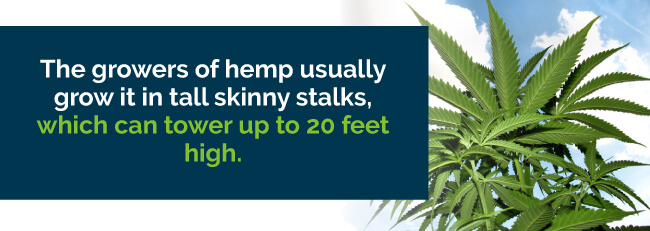
It was initially cultivated in Taiwan almost 10,000 years ago. It was recognized by ancient cultivators to have dioecious characteristics, meaning it had separate genders both female and male.
One variety of this cannabis plant was grown by cultivators to be durable and tall. Today, we know it as industrial hemp. Once they discovered the cannabis plant had flower buds with psychoactive effects, cultivators started to separate the flowering plants from the hemp plants so they could divide the medicinal properties of the plants, which we now refer to as marijuana plants.
Common Uses of Hemp
The industrial hemp plant has always been cultivated for its strong fibers. The fibers were beneficial for building materials, textiles and even fuels, which we still use today. Hemp makes more fiber, fuel, medicine and food than any other type of plant. In fact, it only takes one acre of hemp to produce on a yearly basis:
- Three tons of hempseed meal
- Three hundred gallons of seed oil to use for plastics, fuel and food
- Ten tons of canvas-producing bast fiber
- Twenty-five tons of building material and paper-making hurd fiber
- Linen and rope lace
- Ethanol for fuel produced by its biomass and leaves
Its strength and fiber length make hemp so valuable today. For around two millennia, hemp’s long bast fibers have been used to make paper. In fact, hemp produces more fiber than any other type of plant. A hemp stem or stalk produces two types of fiber: hurd fiber, or the woody core inside, and bast fiber, which is the outer bark.
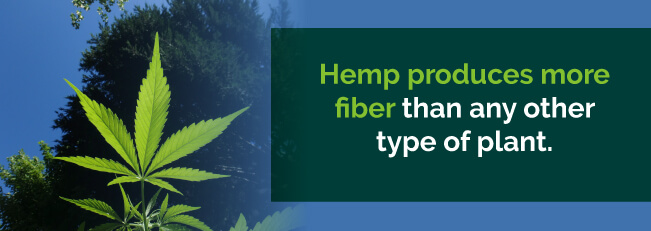
Biodiesel fuel is hemp seed oil. Ethanol is made from hemp biomass. This hemp-based fuel is nontoxic, whereas the petroleum form is very toxic and will poison everything it contacts. Hemp makes more fuel than any other plant. Fuels made from hemp are carbon neutral, and its use helps restore balance in several ways.
Regardless of how much THC content is in it, when farmers harvest hemp to take advantage of its best fuel attributes and when this biofuel replaces fossil fuel, it realigns our entire economic system.
Common uses of hemp include:
- Clothing
- Shoes
- Fine fabrics
- Cardboard and paper
- Rope
- Carpeting
- Fiberboard
- Acrylics
- Fiberglass
- Oil paints
- Shampoos and soaps
- Cosmetics
These are only some of the over 50,000 uses of hemp.

When hempseed oil is used to make plastics, it is also nontoxic and much cheaper. The plastics made from hemp are also biodegradable whereas plastics that are petrochemical produced are not.
Hemp seeds produce more protein and oil than any other type of plant per the cultivated land area. Oil and protein made from hemp are high in essential fatty acids (EFAs), which our cardiovascular system and brain need. It’s also rich in omega-3 and 6 in just the right amount for optimal health in humans. Hemp protein contains eight amino acids in a perfectly balanced amount that meets the nutritional needs of humans.
What Is Marijuana?
Marijuana is a high CBD, high-THC and high-resin Cannabis Sativa plant. It is grown for its medicinal and psychotropic properties that are typically found more in the flowers of the female plants. Cultivators grow them to “spread out” to create a fuller plant, rather than “spread up” like the hemp plant. Marijuana is usually harvested by hand, dried, trimmed and cured, which makes it a horticulture crop.
Marijuana was introduced in the U.S. in the early 20th century after its lengthy trip through ancient and prehistoric world histories in the Middle East, Asia and Central America. It’s believed that Mexican immigrants were the first to bring weed into the United States in 1910 while fleeing the revolution. Grass quickly became popular in the southwest — however, the negative stigma around it also grew just as fast.
Common Uses of Marijuana
Since THC influences our endocannabinoid system directly, marijuana impacts our body, brain and overall functioning.
Although there is a lack of clinical trials, surveys of patients have assisted researchers in determining the most common reasons to use medical marijuana. Just recently, researchers at the VA Palo Alto Health Care System at a California dispensary surveyed 217 patients to determine what health conditions could be helped with cannabis.
Patients reported the primary benefits of weed includes helping with:
- Insomnia
- Chronic pain
- Appetite
- Stress
- Muscle spasms
- Depression
- Anxiety
- PTSD
- Nausea
- Headaches
Out of all these, chronic pain was reported to be helped the most through medical marijuana, with over 37 percent of the participants reporting such relief.
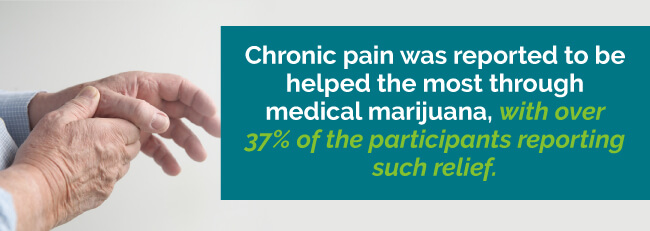
Medical Benefits: Marijuana vs. Hemp
Studies have shown that consuming raw hemp seeds helps to lower cholesterol and blood pressure, improve your immune system, accelerate weight loss, reduce inflammation and control blood sugar levels. Hemp seeds are considered very nutritious. There has been rapid growth in the “hemp for food” industry, which has seen an over 300 percent increase in the past several years and is estimated to be in around 25,000 different products.
Hemp seed oil is great for skin and hair care. It’s considered to be among the best vegetable body care formulas because of its moisturizing effect, nutritional value and replenishing EFAs. EFAs found in hemp seed oil include:
- Omega-3, 6 and 9
- Polyunsaturated fatty acids
- Gamma linoleic acids (GLAs)
- Linoleic acid
GLAs are extremely effective in skin care maintenance and are hardly ever found in natural oils, therefore making hemp an excellent GLA source.
Furthermore, the oil obtained from hemp seeds has also been shown to treat eczema in people. However, whole-plant cannabis oil treats serious skin disorders such as skin cancer more effectively than oil from hemp seed.
Advocates of medical marijuana have often suggested that cannabis can treat cancer in its mild form. Because of this, some cancer scientists are conducting studies on cannabinoids. There’s been a significant amount of cancer research conducted focusing on phytocannabinoids like cannabigerol (CBG) and cannabidiol (CBD), but lately, research has been looking at endocannabinoids that are naturally produced by our bodies.
The European Journal of Pharmacology published a study investigating anandamide anticancer activity. Anandamide is a neurotransmitter our brain produces that helps bind the THC receptors. A team of researchers in the study found that this endocannabinoid can potentially help with battling skin cancer.
There is a big misconception that pot affects your mental health negatively. Although higher doses of THC can cause anxiety in some people — and some people believe it can quicken the onset of a predisposed personality disorder — no reputable or reliable studies can prove this theory.
Today, in the mental health industry, the relationship between weed and mental health has been investigated. It turns out that studies have linked medical marijuana positively in a number of mental health problems. Although researchers are still conducting research, there are several mental health disorders that have been shown to respond well to medical cannabis. These include:
- Opiate withdrawal
- Alcoholism
- Schizophrenia
- Phobias
- Depression
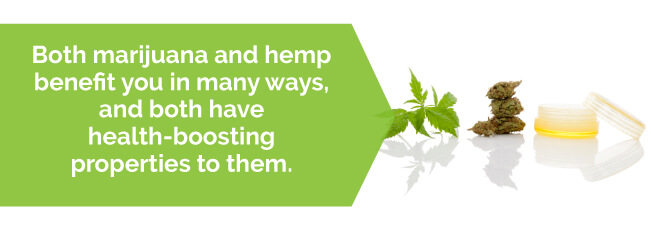
The above are just a few of the mental disorders medical weed can positively affect. Both marijuana and hemp benefit you in many ways, and both have health-boosting properties to them.
Hemp Health Benefits
Although hemp might not offer you the same medicinal value as weed, it does help boost your health by providing you with excellent nutritional value.
A portion of hempseed oil was analyzed by researchers to identify the beneficial characteristics it might have. The researchers found there were some components — aliphatic alcohols, sterols, linolenic acids — in hempseed oil that helped promote good health.
The omega-3 fatty acid was one of the linolenic acids the hempseed oil contained that certain studies have shown to help prevent coronary heart disease. Experts agree that the sterols help lower cholesterol and aid in reducing your risk of heart attack when taken daily.
The aliphatic alcohols have been shown to reduce platelet aggregation and lower cholesterol. Phytol, which is one of these alcohols, even offers anticancer and antioxidant benefits.
Tocopherol is another antioxidant that hempseed oil offers, and it is known to help fight against Alzheimer’s, atherosclerosis and other degenerative diseases.
Marijuana Health Benefits
The marijuana plant currently contains two primary cannabinoids — CBD and THC — that are of medical interest. The main reason people turn to medical marijuana is to help reduce their pain. This pain could be from a certain disease such as cancer, headaches or a long-term disorder like nerve pain or glaucoma. Medical weed is also prescribed by physicians to treat:
- Multiple sclerosis-induced muscle spasms
- Cancer chemotherapy-related nausea
- Seizure disorders
- Weight loss and poor appetite caused by a chronic condition like HIV
- Crohn’s disease
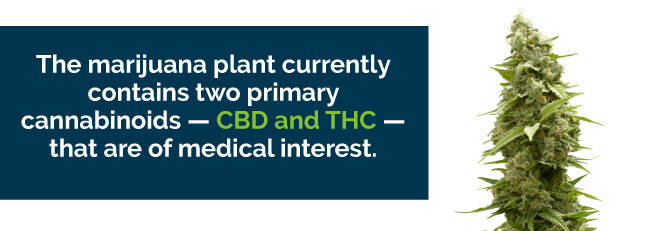
The cannabinoid CBD, unlike THC, doesn’t make you “high.” It is helpful in reducing inflammation and pain, treating addictions and mental illnesses and controlling epileptic seizures.
The marijuana extracts have been found by current animal studies to help decrease the size of certain cancers and kill particular cancer cells. One cell culture study that used rodents showed evidence that purified whole-plant marijuana extracts can slow cancer cell growth down from even more severe types of brain tumors. Also, when combined with radiation, purified extracts of CBD and THC help increase the radiation’s cancer-killing effects.
There are also preclinical and clinical trials being held by scientists and researchers involving pot and its extracts to treat some symptoms of conditions and illnesses such as:
- HIV or AIDS
- Gradual muscle control loss from multiple sclerosis
- Pain
- Inflammation
- Mental disorders
- Substance use disorders
The list of conditions that medical marijuana can help treat is expected to grow.
Differences Between Marijuana and Hemp
The International Association of Plant Taxonomy published a 1976 study showing that both marijuana and hemp varieties come from the same Cannabis genus and the same Cannabis Sativa species. There are also a number of other varieties that are further classified into the Cannabis Sativa species.
Marijuana is the part of the Cannabis Sativa plant that’s cultivated for its potent trichomes, or resinous glands, which contain a high amount of THC, the cannabinoid best known for the psychoactive characteristics it has.
Hemp, on the other hand, is typically cultivated from the Cannabis genus subspecies which has almost no psychoactive characteristics. Hemp varieties are harvested for their oil, fiber and seed, whereas pot is harvested for its recreational, medicinal and spiritual characteristics.
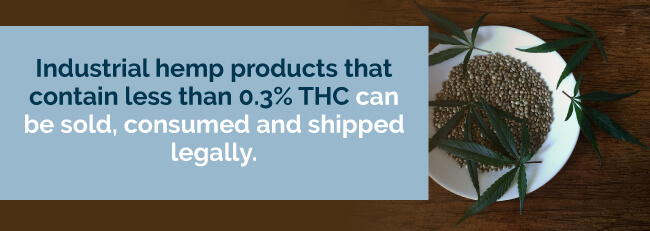
Industrial hemp products that contain less than 0.3 percent THC can be sold, consumed and shipped legally. It’s this 0.3 percent factor that most people differentiate between what is classified as hemp or cannabis.
Similarities Between Marijuana and Hemp
Both cannabis and hemp, as mentioned, come from the same plant. They also both contain CBD, which is an essential cannabinoid. But the hemp plant produces more CBD than it does THC, whereas THC is produced more in marijuana than CBD. They are both, however, classified under the Controlled Substances Act as Schedule I drugs.
Cannabis Oil vs. Hemp Oil
A marijuana plant bud is used to make cannabis oil. High amounts of THC are in cannabis oil, giving it psychoactive characteristics. Marijuana plant seeds are crushed to make hemp oil. It has super-low THC levels, which means you likely won’t get that “high” feeling from it. But it does have high CBD levels that make it useful in reducing paranoia and anxiety and can even be helpful in the treatment of seizures.
Even though they both come from the same species, there are substantial differences in cannabis oil vs. hemp oil. These include the following:
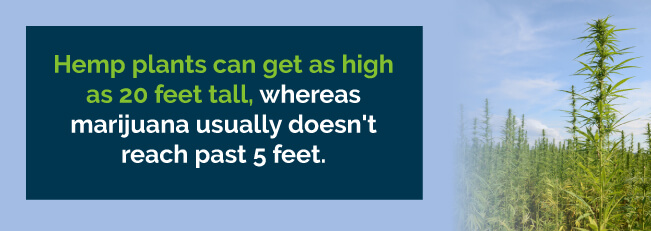
- Plant Differences.Hemp plants can get as high as 20 feet tall, whereas marijuana usually doesn’t reach past five feet. Marijuana tends to have more buds and leaves. Hemp plants grow packed together, where marijuana plants need space to grow. Marijuana requires a warm and humid environment to grow.
- Chemical Compounds.There is hardly any THC in hemp — 0.05 to one percent — whereas there can be up to 14 percent in marijuana.
- Uses.Hemp oil is used to moisturize, calm, soothe and relax you, while cannabis oil is used recreationally for its psychoactive properties.
Cannabis and hemp oil are used in many forms of products, including:
- Concentrates
- Capsules
- Gum
- Supplements
- Edibles
- Tinctures
- Vaporizers & oils
- Topicals
- Pet products
So, between hemp oil and cannabis oil, which one is most recommended? The answer depends on the laws involving medical weed in your state, your doctor’s opinion and your needs.
Marijuana CBD vs. Hemp CBD
Before making your decision between marijuana CBD vs. hemp CBD, it’s essential that you understand there are different CBD varieties. The main distinction falls in the sources of medications. While weed is still illegal in some states, there have been companies that have found legal loopholes to get around these laws. This would be selling industrialized hemp.
The differences between the both are as follows:
Hemp CBD
Hemp CBD oil contains low-THC, high-CBD hemp. Cultivators can extract cannabis oils from these uniquely potent plants. Hemp CBD contains cannabidiol, along with essential minerals, vitamins, terpenes, flavonoids, fatty acids and other cannabinoids that are non-psychoactive.
Although hemp may also be grown to draw out higher levels of CBD through cross-pollination, there is a slim potential of this happening if the hemp plant uses its crop for pollination. Also, there isn’t enough CBD in hemp to provide you with a significant medicinal effect.
Marijuana CBD
When the medicinal cannabis industry experts discuss the oil’s benefits, they are referring to marijuana CBD. Marijuana CBD is low-THC and high-CBD and is proven to help in the treatment of certain conditions. It’s continually demonstrated to provide debilitating conditions with medicinal qualities. The biggest distinction is that this oil from the cannabis plant is harvested mainly for medicinal purposes.
Legalities of Marijuana and Hemp
The 1970 Controlled Substances Act banned industrial hemp harvesting by classifying cannabis as a Schedule I drug. Although cultivating the cannabis plant was met with many obstacles before the Act, this was the federal government’s first time creating legislation that grouped marijuana and hemp essentially into the same classification.
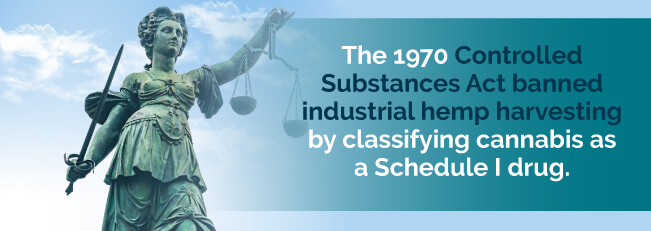
Growers of hemp knew the cannabis plant varieties they were cultivating had little psychoactive properties. However, this didn’t interest lawmakers. Advocates of the “war on drugs” were more focused on removing a plant species they didn’t understand clearly.
Weed is harvested specifically for the flowers that contain THC, and although the hemp plant also produces flowers, it is so low in THC content, it would take great effort to even get high from it. Many states since 1970 have since legalized the cultivation of industrial hemp, despite the federal laws that prohibit it. It’s the persistent public and research that finally pushed for the signing of the 2014 U.S. Farm Bill.
This Farm Bill recognizes and acknowledges the chemical difference between marijuana and industrial hemp. It allows institutions of higher education and state agricultural departments to cultivate industrial hemp to use for research.
Now that we are entering the age where cannabis is becoming legal, distinctions — be they scientific, semantic or legal — are now more important than ever in coming up with responsible laws. To put it simply, it’s really about the cannabis plant. It has such a high number of potential uses that humans have played a significant role in its evolution. And, nobody knows if legal semantics and distinctions will follow science.
Both hemp and marijuana are booming industries. Millions of U.S. citizens are now able to get their bodies, lives and minds back thanks to medical marijuana, and hemp offers the U.S. unlimited potential in the agricultural and industrial arenas.
Search for a Medical Marijuana Doctor or Dispensary
If you reside in a state that has made medical weed legal, your first step is to search for a medical marijuana doctor to obtain a recommendation or authorization so you can become a valid patient. You will need a licensed doctor to diagnose you with a medical condition that is approved by the state as a qualifying medical condition for medical marijuana.
Here at MarijuanaDoctors.com, you can now go online to select a doctor, set up an appointment for a medical cannabis evaluation and find medical marijuana dispensaries that will ship right to your home. We offer many helpful resources and a monthly newsletter to keep you updated on the progress of medical marijuana.

